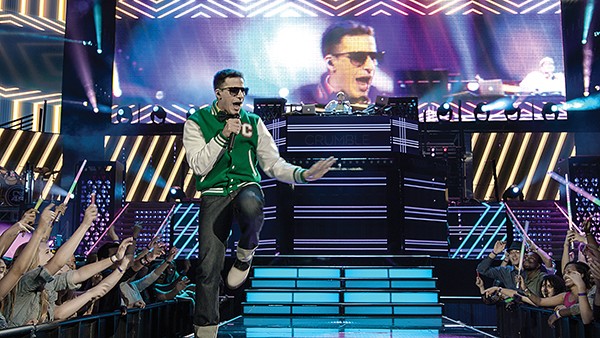In 2005, Andy Samberg, Akiva Schaffer, and Jorma Taccone, collectively known as Lonely Island, were the right guys in the right place at the right time. The second comedy short they produced for Saturday Night Live, a parodic rap video called “Lazy Sunday,” came along just a few months after YouTube’s debut signaled the beginning of the web video era. When people started getting the hang of uploading and sharing videos, “Lazy Sunday” was among the first links passed around, making the Lonely Island guys the template for YouTube celebrity.
The group’s latest venture into cinematic comedy, Popstar: Never Stop Never Stopping, is true to the group’s roots in that it features a passel of new, funny, pop hip-hop songs performed by Samberg as Conner Friel, aka Conner4Real, the former boy band frontman who has gone solo and blown up to Justin Bieber levels of celebrity. But the film also sees Lonely Island acknowledging their influences. Popstar is a mockumentary that applies the Spinal Tap equation to the contemporary music biz.
And I’ll have to say, it’s about time somebody did this. The Biebers and Kanyes and Katy Perrys of the world long ago elevated themselves to the same level of mockable self-importance as arena rockers circa 1983. That was when first-time director Rob Reiner gathered some former sitcom stars, including Michael McKean from Laverne & Shirley and SNL member Harry Shearer, to make a real-seeming documentary about a fake band. This Is Spinal Tap was not hugely successful upon release (partially because people, including Ozzy Osbourne, weren’t clear that it was fake), but it became a cult classic that inspired a generation of comedians. The improvisational style pioneered by Reiner and later perfected by Tap member Christopher Guest in Best In Show, has been hugely influential on modern comedies, including those created by Popstar executive producer Judd Apatow.

Popstar: Never Stop Never Stopping starring Andy Samberg
Handing Lonely Island $20 million and unleashing them onto the pop music landscape is a no-miss proposition. As you would expect from the guys who put Justin Timberlake’s dick in a box, they have the setting and references down cold. Conner starts off as a member of a trio called the Style Boyz who look a lot like the Beastie Boys. But fame goes to their heads, and a dispute over the authorship of a verse leads to Lawrence “Kid Brain” Dunn (Schaffer) leaving the group and retreating into seclusion at a Colorado farm. Owen “Kid Contact” Dunn stays on as Conner’s DJ, whose job is reduced to pressing play on the iPod while Conner preens in front of an arena full of screaming girls.
Following the Tap template, Conner’s new album is not good, despite the fact that he hired more than a hundred producers to make it for him, and what was envisioned as a triumphant world tour is slowly smothered under a blanket of public fiascos. But that’s where the Spinal Tap comparisons cease to be useful, because where Reiner’s film was a strictly vérité affair with only minimal scripting, Popstar‘s screenplay has clearly been honed through several drafts. Spinal Tap plays out like a D.A. Pennebaker documentary, with long, single takes producing laughs by revealing character quirks. Popstar is a more conventional comedy, resorting to over-the-shoulder dialog shots and a throw-it-all-against-the-wall approach to gag delivery.
The supporting cast is a who’s who of comedy in 2016. Sarah Silverman nails the Fran Drescher role of put-upon publicist, while SNL legend Tim Meadows is Conner’s conniving manager. Imogen Poots and Bill Hader both create memorable characters as Conner’s girlfriend and roadie, but there’s not enough time to get to know them amid a flurry of cameos. The movie’s first big laugh comes courtesy of a bit of effortless schtick from none other than Ringo Starr, who leads a cast of musical luminaries including Questlove, Snoop Dogg, Mariah Carey, Pink, RZA, and Seal, who steals the show when he is attacked by wolves.
Befitting our current cultural condition, Popstar is brash and direct where Spinal Tap was sly and stealthy. It may not be groundbreaking, but it’s consistently funny, and it proves that in the music biz, the more things change, the more they stay the same.